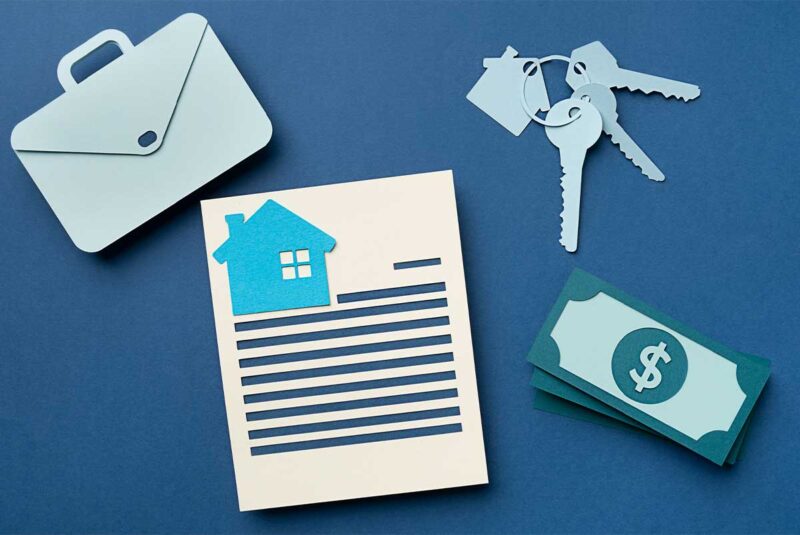Ready To Buy a Home?
Get Approved to Buy a Home
Rocket Mortgage® lets you get to house hunting sooner.
Almost everything can be negotiated when buying a home, from the sale price to who’s responsible for repairs. One aspect that often gets overlooked is seller concessions.
When the seller agrees to cover part of your closing costs, it’s known as seller concessions. These concessions could save you thousands of dollars in upfront expenses when you buy a home.
But what’s considered a seller concession? How do they work? We’ll discuss some of the limitations and how seller concessions could help bring a deal to the closing table. Read on to find out more.
What Are Seller Concessions?
Explore Your Mortgage Options
What are you looking to do?
In real estate, seller concessions are closing costs the person selling the property has agreed to pay on behalf of the person buying the property. They’re called “seller” concessions because the seller is the one giving up something.
Both the buyer and the seller have closing costs they’re traditionally responsible for when closing on a property sale. For the buyer, closing costs are usually 3% – 6% of the purchase price.
Sellers can either pay a flat percentage of the buyer’s closing costs, or buyers can ask them to pay for specific expenses, like the cost of the home appraisal.
Do seller concessions help the buyer or the seller?
It depends on the specifics of the deal and what will benefit each party, but seller concessions have the ability to help both parties. They can also hurt one party more than the other, like any negotiation.
We’ll cover situations when seller concessions can be beneficial or harmful to each party later.
Home is worth it.
The mortgage process can be exciting, and we’ll be with you all the way. Take the first step to owning a home. You’ll be glad you did.
What Can Seller Concessions Cover?
Concessions are usually limited to covering closing costs and fees. These can include:
- Appraisal and inspection fees: The appraisal fee covers the cost of assessing the fair market value of the home. The inspection fee is the cost of inspecting the home for any issues that may need to be addressed before closing.
- Property taxes: This is the money home buyers need to cover property taxes that are prorated through the end of the year. These taxes are due at closing.
- Title fees and title insurance: The title fee is the cost of checking and confirming that the seller has the right to sell the home. Title insurance protects you and your lender from financial losses if the seller doesn’t have the right to sell the home.
- Mortgage origination fee: This is the amount of money your lender will charge to process your loan application.
- Mortgage discount points: This is an optional, upfront fee that’s paid to lower your mortgage interest rate. One discount point equals 1% of the loan’s value, and it can usually lower your mortgage interest rate by 0.25% or more.
When you apply for a loan, these fees will be detailed in your Loan Estimate, which outlines all of your estimated closing costs. Your real estate agent can help you decide which ones to ask the seller to cover.
Are There Limits on Seller Concessions?
Seller concessions can’t be used to cover a down payment or any portion of the loan balance. There are also limits on the total percentage of the home’s value that seller concessions can cover at closing.
The limits usually depend on the type of loan you have and the size of your down payment.
Limits for conventional loans
Fannie Mae and Freddie Mac set very specific limits on the maximum size of seller concessions for a conventional loan. The limit is based on your loan-to-value (LTV) ratio – which is how much you owe on your mortgage divided by the value of the home.
The home buyer’s initial LTV ratio is based on the size of the down payment. So for example, if you bought a home and made a 20% down payment on it, your LTV ratio would be 80%.
If you’re taking out a mortgage for a first or second home, the maximum seller concession would be:[1]
| LTV Ratio | Down Payment Amount | Maximum Seller Concession |
| More than 90% | Less than 10% down | 3% of home’s value |
| 75% – 90% | Between 10% and 25% down | 6% of home’s value |
| Less than 75% | More than 25% down | 9% of home’s value |
Remember, seller concessions are limited to closing costs. If you buy a $200,000 home and put 10% down, you could ask the seller for a concession of up to 6% (or $12,000). But if your closing costs total up to $8,000, you can’t ask the seller to cover more than that.
Also, if you’re buying an investment property, the maximum a seller can offer in concessions is 2% – regardless of the type of loan you get.
Seller concession limits for FHA, VA and USDA loans
No matter how large or small your down payment is, seller concessions for Federal Housing Administration (FHA) and U.S. Department of Agriculture (USDA) loans are capped at 6%[2] Like conventional mortgages, the concessions can’t be used for the down payment.
U.S. Department of Veterans Affairs (VA) loans only allow seller concessions up to 4% of the loan value. However, the money can be used to cover the VA funding fee. This fee is a standard closing cost that usually ranges between 1.25% and 3.3% of the loan value.[3]
Pros and Cons of Seller Concessions
Seller concessions can be a double-edged sword for both the buyer and the seller. Here are some examples of when they can be beneficial and their potential drawbacks.
For the buyer
PROS of seller concessions for buyer👍
When purchasing a home, you’ll need to come up with cash for the down payment and closing costs. Seller concessions can significantly reduce the capital you need upfront, which could allow you to close the deal.
If the home inspection reveals something wrong with the home, but the seller refuses to fix it, seller concessions can be a viable middle ground. The seller doesn’t have to delay the sale to fix the issue, and the buyer receives compensation for taking on the unexpected responsibility.
CONS of seller concessions for buyer👎
If two offers are equal in price but one asks for seller concessions while the other doesn’t, the offer that doesn’t ask for concessions will win most of the time. Work with your real estate agent to understand the market you’re in.
It’s possible for buyers to roll seller concessions into their loans. In these instances, the monthly mortgage payment will be higher, and they’ll pay more in interest over the life of the loan.
For the seller
PROS of seller concessions for the seller👍
One common reason sellers are willing to pay seller concessions is when they’re in a hurry to close. By offering seller concessions, they may be able to close a deal faster – for example, if they have a buyer who’s agreed to pay the purchase price but needs help with cash needed to close upfront.
In a buyer’s market, offering seller concessions can help sellers attract more buyers, which means more potential offers.
CONS of seller concessions for the seller👎
By paying seller concessions, sellers are decreasing their net profit gain from selling the property.
Paying closing costs on the buyer’s behalf requires capital. This can be tricky to cover, especially if the seller has other costs they need to account for, like closing on a new home of their own.
Tips for Negotiating Seller Concessions
For a buyer to receive seller concessions, they often have to ask for them. Negotiations can be one of the trickiest aspects of purchasing a home, so here are some tips to help you.
1. Understand the market
Generally, sellers are more willing to offer concessions in a buyer’s market. It’s critical to understand what the market is doing when you put in an offer. Remember, local reality trumps national trends. Focus on what the real estate market is doing where you plan to buy.
2. Pick your battles
Technically, you can ask for anything you’d like as part of a negotiation, but that doesn’t mean you should. If you know you’re going to offer under the asking price and ask for repairs after the inspection, seller concessions could be a bridge too far. Prioritize what matters to you. For instance, maybe you’re willing to let repairs go in exchange for seller concessions.
3. Lean on your real estate agent
Your real estate agent should be your trusted advisor through offers, negotiations and counteroffers. They do this professionally, so they should be able to offer insight into what’s considered “reasonable” and when you’re asking for too much. They’ll also help you put together all of the necessary paperwork to ensure everything that’s negotiated ends up in the purchase agreement.
FAQs about seller concessions
No, they can only be used to reduce closing costs. The down payment must be provided by the buyer.
Seller concessions shouldn’t affect the home appraisal because they don’t affect the value of the home. The appraiser’s job is to determine the market value of the home – they aren’t concerned with how it’ll be paid for.
Seller concessions, seller contributions and seller assists are synonyms. They all refer to closing costs a seller pays on behalf of the buyer.
Seller Concessions, Final Thoughts
Seller concessions are more than giveaways. They can be a valuable negotiating tactic between a home buyer and a home seller.
When you or your agent negotiates the purchase agreement with the seller or their agent, the concessions must be understood and agreed on by both sides before closing. This way, there are no last-minute disagreements that could derail the sale.
The Short Version
- In real estate, seller concessions are closing costs the person selling the property has agreed to pay on behalf of the person buying the property
- Seller concessions can’t be used to cover the down payment. There are also caps on their acceptable total value based on a percentage of the purchase price
- A seller may be willing to offer concessions if it’s a buyer’s market, or they want to sell a home quickly
Fannie Mae. “B3-4.1-02, Interested Party Contributions (IPCs)” Retrieved April 2023 from https://selling-guide.fanniemae.com/Selling-Guide/Origination-thru-Closing/Subpart-B3-Underwriting-Borrowers/Chapter-B3-4-Asset-Assessment/Section-B3-4-1-General-Asset-Requirements/1032996781/B3-4-1-02-Interested-Party-Contributions-IPCs-08-04-2021.htm#footnote-3651-1
United States Department of Agriculture. “Chapter 6: Loan Purposes 7 CFR 3555.101.” Retrieved April 2023 from https://www.rd.usda.gov/files/3555-1chapter06.pdf
U.S Department of Veterans Affairs. “VA Funding Fee And Loan Closing Costs.” Retrieved April 2023 from https://www.va.gov/housing-assistance/home-loans/funding-fee-and-closing-costs/




